A chain-link fence, often referred to as a field fence, is recognized as the premier choice for protecting farms and ranches. It is designed with the specific purpose of containing animals such as horses and cattle within designated areas.
In installing a field fence, you can expect to spend between $1 to $8 per linear foot. The factors that can affect the cost include the type of wire that you choose, the height of the fence, and the fence post.
There are some considerations that come with selecting the type of field fence for your property. Some of these include the wire gauge, knot style, spacing, height, the length of the fence, and the purposes that you want it to serve.
What we cover
ToggleCost to Install a Field Fence per Foot
In having your field fence installed, the amount of money that you spend is determined by the number of feet required. As a ballpark cost, you can expect to spend between $1 to $8 per linear foot.
For reference, below are the average costs of installing a field fence at a given length:
| Field Fence Length | Average Cost (including installation) |
|---|---|
| 25 linear feet of field fence | $25 to $200 |
| 50 linear feet of field fence | $50 to $400 |
| 75 linear feet of field fence | $75 to $600 |
| 100 linear feet of field fence | $100 to $800 |
| 150 linear feet of field fence | $150 to $1,200 |
| 200 linear feet of field fence | $200 to $1,600 |
| 300 linear feet of field fence | $300 to $2,400 |
| 400 linear feet of field fence | $400 to $3,200 |
The final cost can vary based on the type of the wire that you choose, and the height of the fence. Usually, most fences stand 26 to 48 inches tall. However, some fences can be modified to be taller especially for keeping horses.
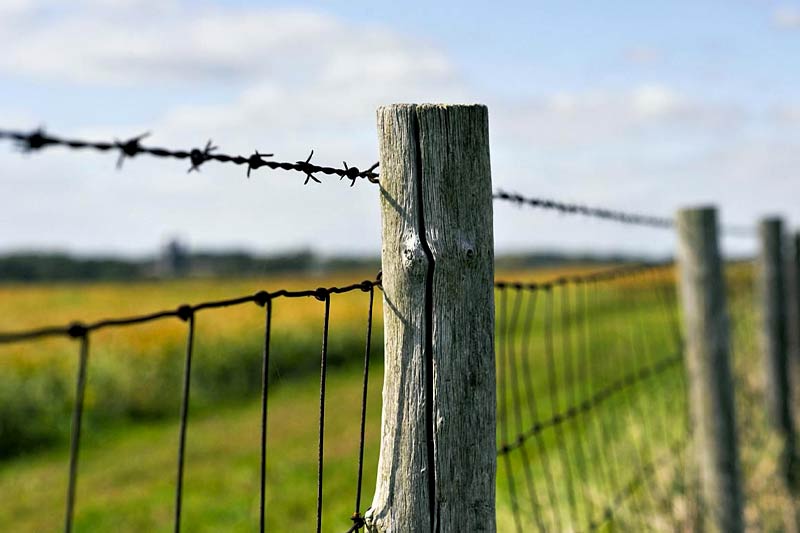
Cost to Install a Field Fence per Acre
If you are installing a field fence on a large scale, you may be billed per acre instead of per foot. For this, you can expect to spend somewhere between the range of $836 to $6,688 per acre, including the labor cost for the hired contractor.
For reference, below are the average costs of installing a field fence per acre, including labor costs:
| Field Fence per Acre | Average Cost (including installation and labor costs) |
|---|---|
| 1 Acre | $836 to $6,688 |
| 2 Acre | $1,672 to $13,376 |
| 3 Acre | $2,508 to $20,064 |
| 4 Acre | $3,344 to $26,752 |
| 5 Acre | $4,180 to $33,440 |
The final cost for installing a field wire fence per acre may include factors such as the type of the material, the height, and the type of terrain where you will install the fence.
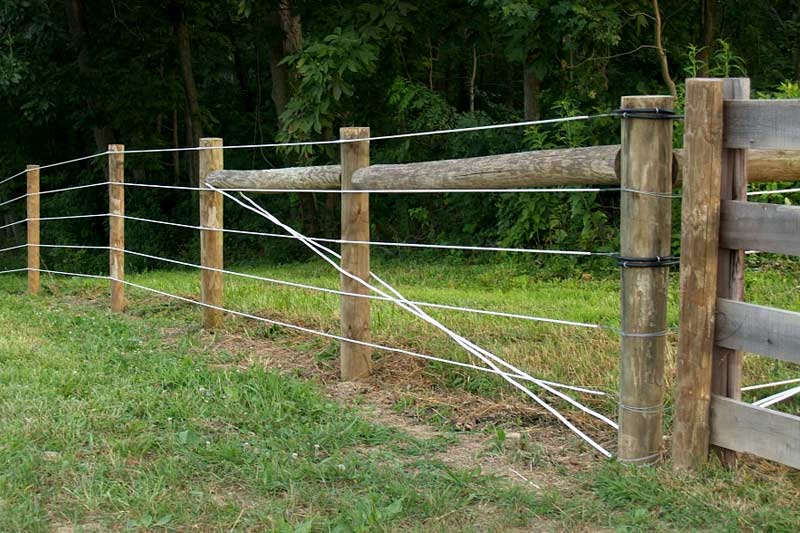
Field Fence Installation Cost Calculator
In calculating the total cost of your fencing project, you have to consider factors such as the type of material, the height of the fence, the labor rate, the accessibility of your property, and added features like gates and decorative elements.
On average, you can expect to pay for the job in the range of $600 to $635, excluding the materials. Typically, property owners spend from $550 to $750 to install a horse fence, for example. The final cost depends on the type and size.
To help you estimate the total cost of your field fence installation, below are some of the cost factors that you can include in calculating:
Project Size by Foot or Acre
- If you will hire a professional to install your fence, you can expect to spend an additional $2 to $6 per linear foot on top of the cost of the materials.
- For instance, if you need to install over a square acre that requires 830 feet of fencing, you can expect to spend an additional $1,660 to $4,980 for the labor costs.
- Normally, the exact costs will depend on your local labor rates, the height of your desired fence, and the number of rails that you want to install.
- Other cost considerations include the condition of your soil where the fence will be installed. If your terrain is uneven, it may incur additional time, equipment, and cost to make it even and conducive for fencing.
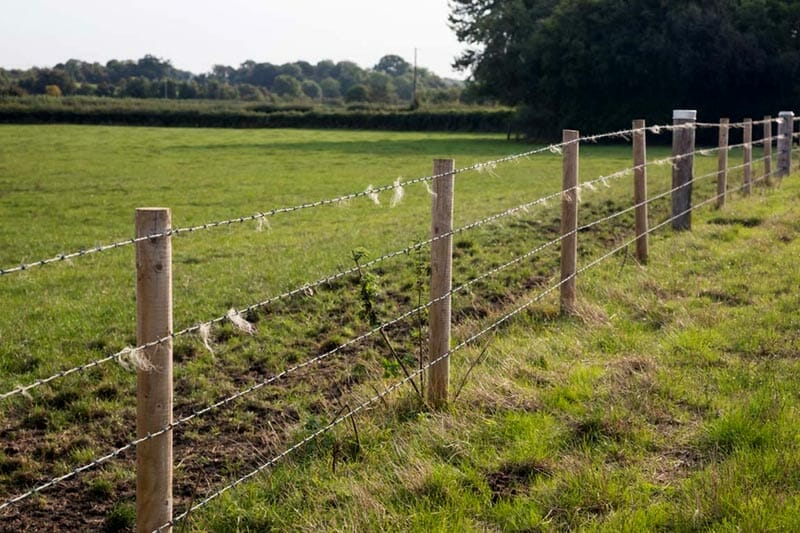
Gates
- Some property owners find it convenient to add one or more gates to their fenced spaces to allow more entry/exit points. This, of course, comes at an additional cost.
- To install a livestock gate, you can expect to spend an additional cost between $150 to $400.
- Typically, these gates are made of tubular, welded steel that is less likely to warp, rot, or get easily damaged like wood.
- The cost of adding a gate can vary depending on its length and height (usually from 6 to 16 feet), its size, style, and other considerable factors.
Material cost to install a field fence
With field fences, you can select from a number of options for the material. Depending on your needs, the type of material can help you build a functional fence while saving costs.
Below are the average costs for the type of material that you want for your field fence:
| Type of material | Cost per foot (excluding fence post) |
|---|---|
| Wood Post and Board | $3 to $9 |
| Vinyl (PVC, Nylon, or Polyethylene) | $1.50 to $3 |
| Woven Wire | $1.50 to $5.90 |
| Bull | $3 to $7 |
| Hog | $3 to $10 |
| Chicken | $2 to $4.50 |
| Welded | $4 to $10 |
Fence post cost by material
In installing a new fence, regardless of its type, the cost for the posts is usually part of the entire fence project cost. However, this might not be the case, especially when you only need to replace or extend your existing fence.
To be functional and secure, field fences must be affixed to fence posts that are securely installed on the ground. Your fence post can depend on the type of field fence that you want to install.
As an average cost, you can expect to spend somewhere between $20 to $60, including its installation. This estimated cost can depend on the material and your desired quality.
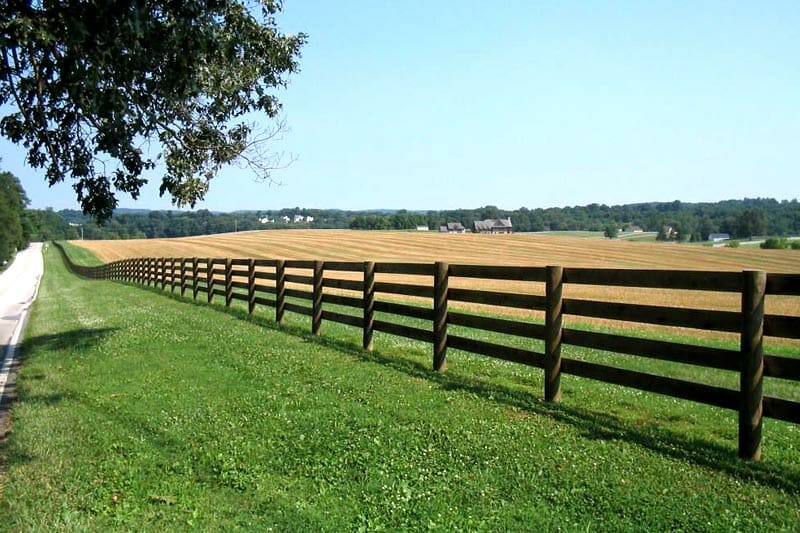
Wooden Fence Posts
Sometimes, wood posts can come with decorative tops and are preferred to be used in combination with wooden frames and mesh wires. This type also comes in different thicknesses and is usually applied best in livestock fencing.
The average cost for a wood post to be installed falls between $20 to $50 per post.
Wood posts are popular for their aesthetic appeal since they appear better compared to metal posts. They are also more versatile and more configurable compared to its counterpart.
One of the disadvantages of wood fence posts is that they are more prone to natural rotting, which may require you to perform regular maintenance or periodic replacement for them.
Metal Fence Posts
In choosing metal fence posts, you can select from thinner rods to more robust and solid pieces. Usually, thin rods are used for lightweight fencing, and the more solid types are used for more robust and heavy-duty fences.
The average cost to install a metal fence post is between $25 to $60 per post, including its installation.
To determine the type of metal post you would need for your field fence, you have to know how strong you need your fence to be. Some of the factors can include the kind of animal that you keep and the purpose you need it to serve.
Normally, metal posts are more durable compared to their counterparts. This type also requires less maintenance. However, one of the drawbacks is that they can be less versatile and not visually appealing.

Types of Field Fences and Their Characteristics
| Type of Field Fence | Characteristics |
|---|---|
| Hinge Joint Fence | Also referred to as farm fencing, this type has four wrap hinge joints that intertwine the wires. Has various height options to help keep different animals. Various horizontal wire spacing to allow various growth periods and tensile strength. Is best for safekeeping rabbits, cats, chickens, sheep, deers, and horses. |
| Fixed Knot Fence | This type combines the hinge joint with high tensile steel wire, which has stronger fabrics and can be installed faster with lesser use of fence posts. Comes in various height variations. Is ideal for safekeeping cattle, camels, horses, and deers. |
| Chicken Wire Fence | Chicken wire adopts the characteristics of galvanized wire, stainless steel wire, and PVC coated wire. The result allows for an impressive anti-corrosion and durable fence wire. With steel wires that are woven into hexagon meshes, the chicken wire fence is a great choice for lightweight fencing. This type is ideal for keeping chicken, goose, rabbit, and garden purposes. |
| Steel Wire Hex Deer Fence | Also called metal hex deer fencing, this type is metal coated with black PVC, allowing it to be the best deer fencing. It can offer less visible, more durable, and stronger deer fencing. This is best for property owners who keep deers who frequently damage fences from chewing, or for those who want to have better fencing. |
Installing a Field Fence: Hiring a Contractor vs DIY
Installing a field fence can be quite a labor-intensive process. The tasks can include but are not limited to, planning, measuring, procurement of materials, and the installation itself.
Some people who have experience with tools may find this task doable; however, there might be necessary equipment and expertise that you may not find in your shed.
Although hiring a professional can significantly increase your total expense, this price can come worthwhile since a professional will surely have the skills and expertise to properly install your field fence.
Moreover, doing so would assure you that the structure is professionally done, saving you the risk of paying more for the repair and rework or if it costs you unwanted accidents with your important livestock and cattle.
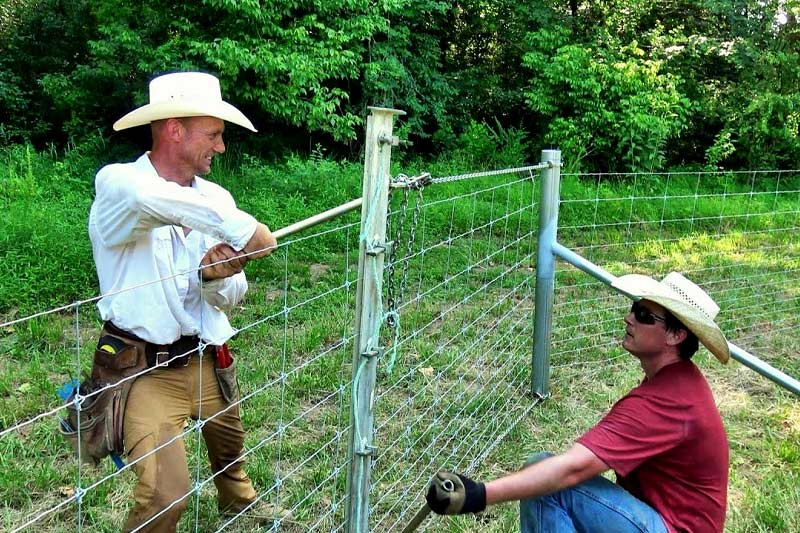
How long does it take to install a field fence?
The time it would take to install a field fence can depend on multiple factors. These can include the job size, terrain conditions, weather conditions, and the number of gates you want to have, should there be any.
Most of the time, field fences can be installed in 1 to 3 days. As a rule of thumb, it should not take weeks, especially when the fence posts, gates, and rails are already installed.
If your hired contractor takes weeks to finish the job, they may be over-extending their job, making you pay more.
Types of field fences and their characteristics
Field fences and their types are not a one-size-fits-all situation. Depending on the type of animal that you keep, or the purposes that you want your field fence to serve, your field fence type, material, height, and quality can vary.
| Type of field fence | Characteristics |
|---|---|
| Deer fence | The height of deer fences can usually range between 6 feet to 15 feet high. However, 6-foot tall deer fences are rare since most deers can leap over them. Deer fences can either be a poly fence or a steel fence. Steel wire deer fencing can offer less visibility. |
| Hinge joint fence | Also referred to as farm fencing, this type has four wrap hinge joints that intertwine the wires. Has various height options to help keep different animals. Various horizontal wire spacing to allow various growth periods and tensile strength. Is best for safekeeping rabbits, cats, chickens, sheep, deers, and horses. |
| Camel fence | Also called “cattle fence”, this type is best used for keeping camels or as borders in fields and grassland. Camel fences can protect camels from damage and can do a great job in keeping camels contained in a specific space. This type comes in a fixed knot or hinge joint fencing variations. Also suitable for cattle, horses, deer, and sheep. |
| Fixed knot fence | This type combines the hinge joint with high tensile steel wire, which has stronger fabrics and can be installed faster with lesser use of fence posts. Comes in various height variations. Is ideal for safekeeping cattle, camels, horses, and deers. |
| Chicken wire fence | Chicken wire adopts the characteristics of galvanized wire, stainless steel wire, and PVC coated wire. The result allows for an impressive anti-corrosion and durable fence wire. With steel wires that are woven into hexagon meshes, the chicken wire fence is a great choice for lightweight fencing. This type is ideal for keeping chicken, goose, rabbit, and garden purposes. |
| Corral panels | This type of field fencing refers to large pens that are used for fencing cattle, horses, sheep, and other livestock animals. Corral panels are usually made of powder coating steel tubing or quality hot-dipped galvanized steel tubing. Comes in round, square, and oval tube variations. A few of the distinct characteristics of corral panels are that they are robust, portable, and have excellent rust resistance, and are not corrosive. This type is best for keeping horses, cattle, and sheep. |
| Steel wire hex deer fence | Also called metal hex deer fencing, this type is metal coated with black PVC, allowing it to be the best deer fencing. It can offer less visible, more durable, and stronger deer fencing. This is best for property owners who keep deers who frequently damage fences from chewing, or for those who want to have better fencing. |













